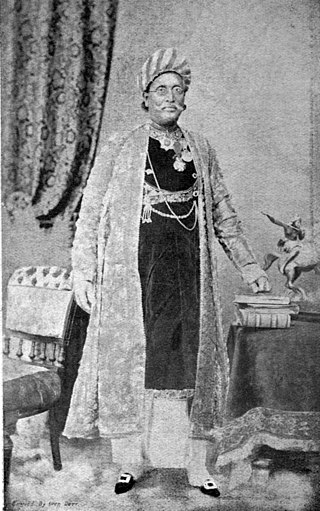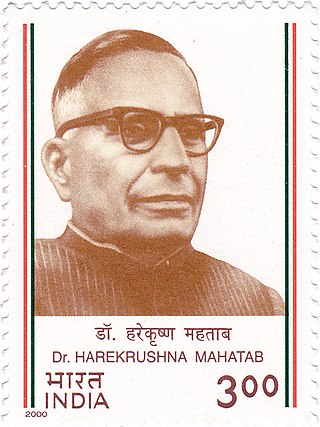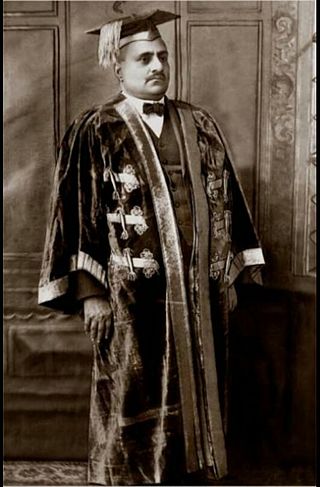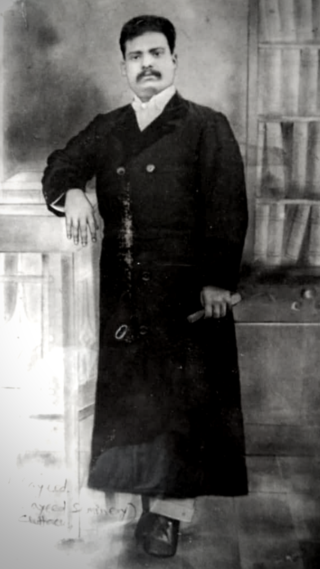Related Research Articles

Nawab Bahadur QaziAbdul Latif was a Bengali Muslim aristocrat, educator and social worker. His title, Nawab was awarded by the British in 1880. He was one of the first Muslims in 19th-century India to embrace the idea of modernisation.

Barindra Kumar Ghosh or Barindra Ghosh, or, popularly, Barin Ghosh was an Indian revolutionary and journalist. He was one of the founding members of Jugantar Bengali weekly, a revolutionary outfit in Bengal. Barindra Ghosh was a younger brother of Sri Aurobindo.
The Scientific Society of Aligarh was a literary society founded by Sir Syed Ahmad Khan at Aligarh, India. The main objectives of the society were to translate Western works on arts and science into vernacular languages and promote western education among the masses.

The Imperial Legislative Council (ILC) was the legislature of British India from 1861 to 1947. It was established under the Charter Act of 1853 by providing for the addition of 6 additional members to the Governor General Council for legislative purposes. Thus, the act separated the legislative and executive functions of the council and it was this body within the Governor General's Council which came to known as the Indian/Central Legislative Council. In 1861 it was renamed as Imperial Legislative Council and the strength was increased.
Odia literature is literature written in the Odia language, mostly from the Indian state of Odisha. The modern Odia language is mostly formed from Tadbhava words with significant Sanskrit (Tatsama) influences, along with loanwords from Desaja, English, Hindustani (Hindi/Urdu), Persian, and Arabic. Its earliest written texts date from around 1000 CE. The earliest Odia newspaper was Utkala Deepika, first published on August 4, 1866.
Odisha is one of the 28 states of India, located on the eastern coast. It is surrounded by the states of West Bengal to the northeast, Jharkhand to the north, Chhattisgarh to the west and northwest, and Andhra Pradesh to the south and southwest. Odia is the official and most widely spoken language, spoken by 33.2 million according to the 2001 Census. The modern state of Odisha was established on 1 April 1936, as a province in British India, and consisted predominantly of Odia-speaking regions. April 1 is celebrated as Odisha Day.

Harekrushna Mahatab was the leader of the Indian National Congress, a notable figure in the Indian independence movement and the Chief Minister of Odisha from 1946 to 1950 and again from 1956 to 1961. He was popularly known by the sobriquet "Utkal Keshari".

Ubaidullah Al Ubaidi Suhrawardy was a Bengali Islamic scholar, educationist and writer from Midnapore. He is often regarded as the Father of modern Islamic education in Bengal.

Madhusudan Das was an Indian lawyer and social reformer, who founded Utkal Sammilani in 1903 to campaign for the unification of Odisha along with its social and industrial development. He was one of the prominent figure, helping in the creation of Orissa Province, which was established on 1 April 1936. He was also the first graduate and advocate of Orissa. He is also known as Kulabruddha, Madhu Babu, and Utkal Gouraba. In Odisha, his birthday is celebrated as the Lawyers' Day on 28 April.

General elections were held in British India in 1920 to elect members to the Imperial Legislative Council and the Provincial Councils. They were the first elections in the country's modern history.

General elections were held in British India between 28 October and late November 1926 to elect members of the Imperial Legislative Council and the Provincial Legislative Councils.
General elections were held in British India in September 1930. They were boycotted by the Indian National Congress and marked by public apathy. The newly elected Central Legislative Assembly met for the first time on 14 January 1931.

Pandit Nilakantha Das (1884-1967) was one of the most illustrious sons of Odisha, who appeared both in its political and literary arena at the most crucial period of its history, when Odisha had no political identity in the map of India, and Odia as a language was about to be extinct. He worked relentlessly for Odisha's recognition both politically and linguistically, and helped bring to fruition the dreams of Utkala Gaurab Madhusudan Das, Utkalamani Gopabandhu Das and all other Odia loving people.

Gourishankar Ray, better known as Karmaveer Gourishankar, a prominent figure amongst the makers of Modern Orissa (Odisha) as well as the savior of Odia (Oriya) language and literature, who led the Save Oriya Movement during the late nineteenth century working relentlessly for the protection and preservation of the Odia language. He was a Bengali from East Bengal from a Zamindar family at a time when an anti Oriya movement rocked the province to replace it by Bengali in the coastal, Hindi in the western and Telugu in the southern Orissa which ultimately was thwarted and Oriya was given its due place.

Nawazish Muhammad Khan, also known as Mirza Muhammad Raza, was a Mughal aristocrat and the deputy governor of Dhaka in the 18th century.

Sayeed Mohammed was an Indian Odia educationist, freedom fighter and philanthropist. In 1913, he founded the Moslem Seminary at Cuttack, which is regarded as the second nationalist school of Odisha. Sayeed is known for his activism against the British in the early 1900s. He was one of the prominent members of the Utkal Sammilani. In 1922, Sayeed along with Ekram Rasul co-founded the All Odisha Khilafat Committee, in the wake of the Non cooperation movement in India.

The Bhoi dynasty or the Yaduvamsa dynasty were a medieval Hindu dynasty from the Indian subcontinent, which originated in the region of Odisha that reigned from 1541 to 1560 CE. Govinda Vidyadhara had usurped the throne from the later weaker Suryavamsa Gajapati Empire rulers as the kingdom started weakening but had a short-lived reign as ruling chiefs of Odisha as the ensuing internal rivalries and constant threats of invasions rendered them weak and were eventually overthrown by Mukunda Deva of Chalukya dynasty in 1560.
The Suhrawardy family with over nine hundred years of recorded history has been one of the oldest leading noble families and political dynasties of the Indian subcontinent and is regarded as an important influencer during the Bengali Renaissance. The family has produced many intellectuals who have contributed substantially in the fields of politics, education, literature, art, poetry, socio-religious and social reformation. Numerous members of the family, both biological descendants and those married into the family, have had prolific careers as politicians, lawyers, judges, barristers, artists, academicians, social workers, activists, writers, public intellectuals, ministers, educationists, statesmen, diplomats and social reformers.

Acharya Harihar was a freedom fighter, teacher and social worker born to a Brahmin family in Sakhigopal in Puri District of Odisha. As a teacher of Satyabadi Bana Bidyalaya, he actively and successfully participated in the literary work of Satyabadi. He composed a translation of the Bhagavad Gita in Odia and children's grammar book in Odia language.
References
- ↑ Nanda, Prof M. N. Das & Dr C. P. (2001). Harekrushna Mahtab. Publications Division Ministry of Information & Broadcasting. ISBN 978-81-230-2325-0.
- ↑ Chopra, Pran Nath; Puri, Baij Nath; Das, Manmath Nath (1974). A social, cultural and economic history of India. Vol. 2, Vol. 2. Delhi; Bombay; Calcutta; Madras: Macmillan India. OCLC 1129470470.
- 1 2 "Ibrahim Suhrawardy" (PDF).
- ↑ "Satyagraha memory fades with time". www.telegraphindia.com. Retrieved 2 June 2020.
- ↑ Steinberg, S. H., ed. (1957). "The British Commonwealth and Empire". The Statesman's Year-Book: Statistical and Historical Annual of the States of the World for the Year 1957. The Statesman’s Yearbook. Palgrave Macmillan UK. pp. 51–560. doi:10.1057/9780230270862. ISBN 978-0-230-27086-2.
- ↑ "Contributions of Ibrahim Suhrawardy" (PDF).
- ↑ "The Odia Suhrawardy" (PDF).
- ↑ Firdous, Shamim (2015). "Role of Nawab Abdul Latif in the Development of Modern Education in Colonial Bengal". Proceedings of the Indian History Congress. 76: 500–510. ISSN 2249-1937. JSTOR 44156615.
- ↑ Firdous, Shamim (2015). "Role of Nawab Abdul Latif in the Development of Modern Education in Colonial Bengal". Proceedings of the Indian History Congress. 76: 500–510. ISSN 2249-1937. JSTOR 44156615.
- ↑ "Historic site for a day, forgotten for the rest". My City Links. 18 August 2012. Retrieved 19 November 2020.